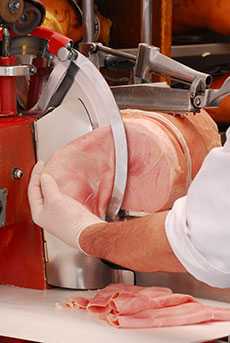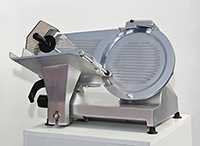How Often Retail Delis Clean Their Slicers
This page shows the study purpose, method, results, conclusions, and recommendations in plain language for the EHS-Net project titled Retail Deli Food Safety Practices Study.
The findings and recommendations from this project are also in fact sheet format [PDF - 120 KB].
Citations for more EHS-Net publications are available by Study Topic or by Citation.

Key Findings & Recommendations
We found that about half of the sampled retail delis did not fully clean their slicers as often as the Food and Drug Administration (FDA) recommends. FDA sets these recommendations to prevent Listeria monocytogenes (Lm) and other germs from spreading. These germs can make people sick if they get into food or onto surfaces (cross-contamination) and can cause foodborne illness outbreaks.
We recommend that states, localities, and the retail food industry use information from this study to inform prevention efforts. These efforts should focus on independent and small delis and should encourage or require
- Deli manager training and certification and
- Written slicer-cleaning policies consistent with FDA guidelines.
Study Problem
Lm causes the third highest number of foodborne illness deaths in the United States each year. It has been found in a variety of foods, including cooked or processed foods such as deli meats. Lm contamination of sliced deli meats at retail locations is a major cause of listeriosis illness and outbreaks. To prevent this, the FDA Food Code recommends that food contact surfaces, like deli slicers, be fully cleaned (taken apart, cleaned, and sanitized) at least every 4 hours.
We need to know more about practices in retail delis to prevent Lm growth and cross-contamination. This information can help delis and food safety programs make improvements to reduce risk.
Study Purpose
The purpose of this study is to describe
- Whether deli slicers are fully cleaned as often as FDA recommends (every 4 hours) and
- Deli, manager, and worker traits related to how often slicers are cleaned.

Study Method
Participants
EHS-Net environmental health specialists collected data in about 50 randomly selected delis in each of the EHS-Net sites (California, Minnesota, New York State, New York City, Rhode Island, and Tennessee).
Data Collection
Data were collected in 298 delis. In each deli, data collectors interviewed a manager and gave an eight-item food safety knowledge survey to the manager. In almost all of the delis, data collectors also interviewed a food worker.
Study Results
Only about half of the interviewed deli managers and food workers said that their deli slicers were fully cleaned as often as the FDA recommends.
Managers and workers in delis with any of the following characteristics were more likely to say that their slicers were fully cleaned as often as the FDA recommends:
- Chain delis,
- Delis with more slicers,
- Delis with more customers,
- Delis that require manager food safety training,
- Delis with workers knowledgeable about food safety,
- Delis with a written slicer-cleaning policy,
- Delis with easy-to-clean slicers, and
- Delis with a manager certified in food safety.
Study Conclusions
- Many retail delis do not fully clean their food slicers as often as FDA recommends (every 4 hours) to prevent the spread of Lm and other germs that cause foodborne illness.
- Deli ownership, deli size, manager and food worker safety knowledge, training, and certification, written slicer-cleaning policies, and easy-to-clean deli slicers are each associated with slicers being cleaned more often.
Key Terms
- Cross-contamination: spread of germs from one surface or food to another by contact.
- Environmental health specialists: public health workers who enforce health and safety standards related to food and other consumer products.
- Foodborne illness: an illness caused by germs in food.
- Foodborne illness outbreak: when two or more people have the same sickness after eating food from the same place.
- Listeria monocytogenes: germ that causes the foodborne illness listeriosis, a serious infection.
- Retail delis: delis that prepare or serve ready-to-eat foods to customers where there is usually a delay between purchasing the food and eating the food. Grocery stores often have retail delis.
- Sliced deli meats: meats sliced in a deli at the time of purchase.
- Page last reviewed: March 30, 2016
- Page last updated: August 15, 2016
- Content source:


 ShareCompartir
ShareCompartir